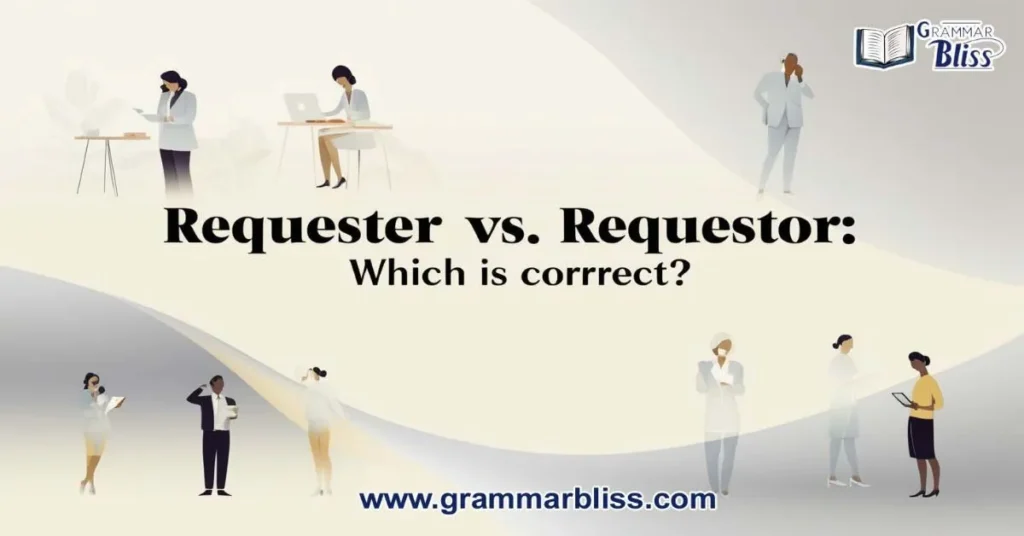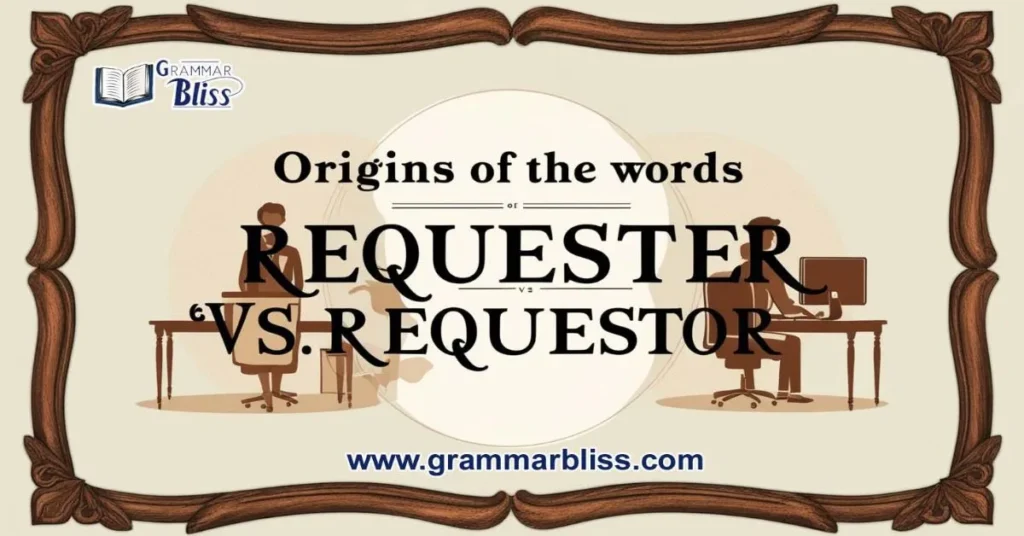When it comes to writing clear and professional content, choosing the right terms is essential. One common dilemma is whether to use “requester” or “requestor.” Both words mean someone who makes a request, but they have different connotations and usage depending on the context.
The choice between “requester” and “requestor” can impact the clarity and professionalism of your writing. Here, we will explore the meanings, origins, and proper usage of these two terms. Understanding the nuances will help you select the correct word for any formal or informal writing task. By the end, you’ll be confident in your word choice for different audiences and document types.
Quick Summary
At first glance, “requester” and “requestor” look almost identical. Both refer to someone making a request. However, their usage differs based on the context. In general, requester is the preferred term in most situations, especially in informal writing and business communication. On the other hand, requestor is often used in legal documents, technical writing, and other formal settings, where precision and formal tone matter.
Read: Similes for Love: Expressing Emotions Through Comparisons
Meaning of “Requester or Requestor”
Both “requester” and “requestor” refer to a person who is asking for something. They come from the same Latin root word, requaerere, which means “to seek” or “to ask.” Despite their similarities, the two terms carry slightly different connotations depending on the style of writing and audience.
Requester is the more widely used form. It is a straightforward, neutral term that works well in most contexts. Whether you’re drafting an email, preparing a business proposal, or writing a request form, requester is typically the better choice because of its versatility. It’s an easy word to understand and is widely accepted in both formal and informal settings.
Requestor, on the other hand, is more formal and is generally found in legal terminology, technical documentation, or specialized fields. For example, you might encounter requestor in court petitions, API documentation, or highly technical manuals. It’s a term that signals precision and structure, which is why it’s often used in professional writing and environments that demand clarity in writing.
Requester vs Requestor: Which is Correct?

When it comes to choosing between “requester” and “requestor”, the decision often depends on your audience and the tone of your writing. Requester is more common and is acceptable in most cases. If you’re writing an internal memo, business proposal, or an informal letter, you’re safe using requester.
On the other hand, requestor is best for formal writing that requires precision. It appears more frequently in legal documents, such as court records and legal petitions, as well as in technical writing like API requests or technical manuals. When you need to ensure that your language rules are followed strictly, especially in business writing or technical documentation, requestor is the better choice.
In some cases, both terms can technically be correct, but their usage in specific fields makes them feel more suited for one type of writing than the other. The key is understanding the context and tone you’re aiming for.
American vs. British English
One of the factors to consider when choosing between requester and requestor is whether you’re writing in American English or British English. In American English, both terms are used, but requestor is more common in formal and technical contexts. British English, on the other hand, prefers requester in nearly all situations, including both formal and informal writing.
For example, if you’re working in the U.S., especially in fields like business communication or technical writing, you might lean toward requestor for legal or technical documents. In the UK, requester would generally be the go-to word even for these kinds of formal settings. Understanding regional preferences can be crucial if you’re writing for an international audience or working in a multicultural environment.
Learn: Congress’s vs. Congress’: Understanding the Difference
Formal vs. Informal
Requester and requestor also differ in their appropriateness for formal vs. informal writing. If you’re writing a casual letter or email, or even a business communication that isn’t overly formal, requester is usually your best bet. It has a neutral tone that won’t overwhelm your audience with unnecessary formality.
In contrast, requestor should be used in more formal documents where the language precision is critical. This includes legal petitions, court records, and even technical documentation like API documentation. If you’re writing for a highly specialized audience that values technical terminology and exact language, requestor fits the bill.
When in doubt, think about your document type and audience. If it’s a document that requires a formal tone, like a business proposal or contract, requestor is likely the better choice.
Origins of the Words “Requester vs. Requestor”

Both “requester” and “requestor” come from the Latin verb requaerere, meaning “to seek” or “to ask.” Over the centuries, the evolution of the English language led to slight variations in the way these terms were used.
The word requester follows a more general and conversational pattern in English. It is a straightforward and easily understood term that’s become common in everyday language. Its counterpart, requestor, emerged as a more formal version, often used in specialized contexts like law and technical documentation. The use of -or in English often signals a more technical or formal usage, which is why requestor carries a weight of professionalism that requester does not.
Synonyms of “Requester or Requestor”
Both requester and requestor have a variety of synonyms, depending on the context in which they are used. Here are some alternatives you might encounter:
- Applicant: Someone who applies for something, often used in business proposals or job applications.
- Petitioner: A term used in legal petitions, such as when someone formally asks a court for something.
- Seeker: A more informal term for someone looking for something, commonly used in informal writing.
- Inquirer: A formal term for someone asking for information, frequently used in research or survey forms.
- Solicitor: A term used in legal contexts, such as when a lawyer requests something on behalf of a client.
Using the right synonym can help you refine your writing style. For example, if you’re drafting a court petition, you’d choose petitioner instead of requester to match the legal terminology.
Explore: Is All a Preposition? Exploring Its Roles in English Grammar
Grammar Rule and Examples
When using requester or requestor, it’s important to follow grammar rules for proper sentence structure. The terms are both countable nouns, meaning they can be used with articles like “a” or “the.”
Here are a few examples:
- Requester: “The requester must fill out the form before submitting it.”
- Requestor: “The requestor filed a formal petition for an extension.”
Notice how both words can fit easily into sentences with proper subject-verb agreement. It’s also important to maintain consistency in your use of either term throughout a document to avoid confusion.
FAQ’s
What’s the difference between “requester” and “requestor”?
“Requester” is more commonly used in everyday and business writing, while “requestor” is preferred in formal or legal contexts.
Can “requester” be used in formal writing?
Yes, “requester” can be used in formal writing, though “requestor” is often favored for greater precision.
Which term is more common in American English?
“Requester” is more common in American English, though “requestor” appears in specialized fields like law and technical writing.
Is “requestor” used in British English?
No, in British English, “requester” is the preferred term in almost all contexts.
Can both terms be used interchangeably?
Yes, both can be used interchangeably, but the choice depends on the context and tone of your writing.
Conclusion
Choosing between “requester” and “requestor” depends on the context, audience, and tone of your writing. While “requester” is more versatile and commonly used in informal writing and business communication, “requestor” carries a more formal tone, making it suitable for legal documents, technical writing, and specialized fields. Always aim for consistency in your writing to ensure clarity and professionalism. By understanding the subtle differences between these terms, you’ll enhance the precision and effectiveness of your communication in both formal and casual settings.

